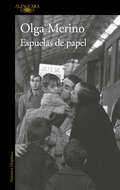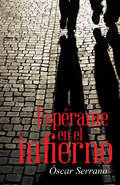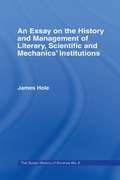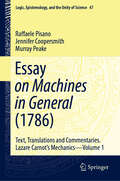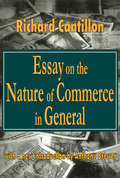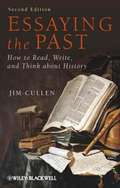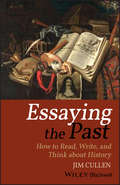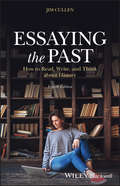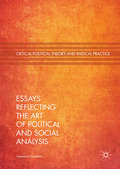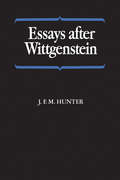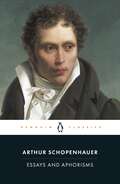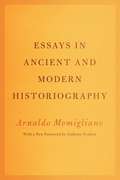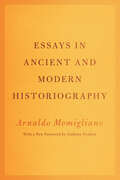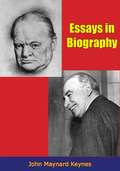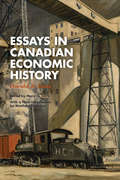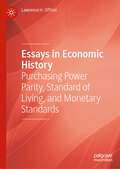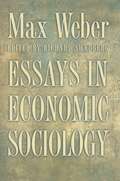- Table View
- List View
Espuelas de papel
by Olga MerinoEspuelas de papel es una narración llena de imágenes y emoción, donde el amor imposible, la traición y los deseos de los protagonistas nos trasladan a una época e silencio, derrota y esfuerzo.«...siempre hacia adelante, siempre, aunque tengas que picar el vientre del caballo con espuelas de papel.»En los años cincuenta, Juana, una joven andaluza, emigra con su familia a Barcelona huyendo del hambre y la pobreza. Como una cenicienta de posguerra, entra a servir en casa de Salud Monterde y sus hijas, enriquecidas gracias a un asunto turbio. Cuando la vida desvanezca sus ilusiones, el amor de Liberto, el anarquista perseguido, será su único refugio.Olga Merino se revela en esta novela dueña de un lenguaje original y fuerte, de una expresividad que ahonda en la humanidad de los personajes, que viven acosados por las voces de la memoria.
Espérame en el infierno
by Óscar SerranoIntriga y espionaje al más puro estilo de clásicos como Forsyth, Fleming o Le Carré. <P><P>Una trepidante historia de valentía, en la que una delgada línea separa la frontera entre el bien y el mal. <P> A finales de los años noventa, los asesinatos de dos agentes durante una operación secreta en Roma sacuden el CNI. <P>El asunto permanece enterrado hasta que la vigilancia sobre un diplomático ruso, miembro del FSB, revela algo turbio detrás de aquella tragedia. <P>Samuel, un atrevido y eficaz espía, integrante de aquel equipo, quiere respuestas. Iniciará una investigación que le llevará hasta lo más profundo del crimen organizado internacional. <P>Pronto entenderá que en las cloacas del estado no hay lugar para la justicia. Entonces Samuel elegirá venganza.
Espías, Espionaje y Operaciones Encubiertas Desde la Antigua Grecia hasta la Guerra Fría
by Marcela Gutiérrez Bravo Michael RankDel autor del #1 bestseller Grandes Generales de la Historia llega un Nuevo exitante libro sobre los más grandes espías de la historia y cómo sus actos de espionaje y operaciones encubiertas cambiaron el curso de la historia. Ya sea Eneas Tacticus, quien creó la ciencia militar del occidente; Francis Wlasingham, el espía maestro de la Reina Elizabeth quien frustró numerosos intentos de asesinato y forjó una red de espionaje internacional en el ocaso del colonialismo Europeo; o Richard Sorge, el espía alemán alcohólico de los soviéticos cuya intercepción de inteligencia militar previno el colapso del ejército ruso en la Segunda Guerra Mundial, cada uno de estos espías tuvo un impacto mayor en la sociedad moderna. Este libro explorará las vidas y tiempos de los diez más grandes espías, o redes de espionaje, en la historia. Algunos han guardado un estatus de legendarios, como Mata Hari, la cortesana y bailarina exótica de la era de la Primera Guerra Mundial quien compartió la cama de tantos oficiales franceses y alemanes que no podía evitar volverse doble agente. Otros espiaron por convicciones ideológicas puras, como George Koval, el espía de Iowa que filtró secretos nucleares estadounidenses a la Unión Soviética, acelerando el programa nuclear de Rusia por años y haciendo la carrera armamentista de la Guerra Fría posible. Otros han tenido una adoración religiosa -Nathan Hale, el espía de la era revolucionaria, tuvo una Carrera muy corta pero se convirtió en el primer mártir de Estados Unidos y un símbolo nacional. Cualquiera que haya sido su razón de espionaje, estos espías representaron la mano invisible del poder del gobierno. Sus vidas fueron rodeadas de misterio - y muchos tuvieron antecedentes tan convulses que aún no comprendemos cuáles fueron sus verdaderas lealtades, si es que tuvieron alguna. Pero, a pesar de sus vidas enigmáticas, fueron la mano invisible que ayudó a dirigir el curs
Espíritu Guerrero luchando contra los reinos de oscuridad
by Crystal Mary LindseyLa madre de Serenity la abandona al nacer. Dejada para ser criada por su abuela, ella aprende los secretos de la medicina herbal. Cuando su abuela muere, su madre y su padrastro reaparecen en su vida, poniendo a Serenity en un peligro moral. Dándose cuenta de esto, escapa lejos de sus garras en la oscuridad de la noche. Sin imaginarse nunca que Dios la usaría de manera extraordinaria. La palabra dice en Efesios 6: 10-11 y nos llama a ‘fortalecéos en el Señor y en el poder de su fuerza’ y a, ‘vestirse de toda la armadura de Dios, para que podáis estar firmes contra las asechanzas del diablo’. Luego se nos dan los detalles de cómo ponerse cada pieza de la armadura, se nos dice tomar el escudo de fe ‘con que podáis apagar todos los dardos de fuego del maligno’. Los hijos de Dios deben ser espíritus guerreros. Sólo unos cuantos pueden ver el reino espiritual del bien y del mal. Serenity Charles es una joven a la que se le ha dado el don de la visión espiritual y con ello, se compromete a luchar contra los poderes de maldad. Los ojos espirituales de Serenity (Rena) son abiertos para ver el engaño malvado y observa a los demonios que viven entre los humanos causando una conducta destructiva. Portando la armadura sagrada, Serenity entra a la batalla para proteger a aquellos a quienes los demonios quieren fríamente dañar o aniquilar. Con su escudo ella se protege de los dardos de fuego mientras usa su espada de la palabra, ella los corta en pedazos enviándolos fuera mientras escapan lejos gritando de pánico. Tres de los ángeles guerreros de Dios, Avigdor, Ariel y Akim son sus guardianes y colaboradores apoyándola para lograr la victoria. Aiden Baker, un jefe minero conoce y es cautivado por la belleza de Rena. Él pelea contra la atracción que siente por ella, ya sea ignorando o expresando su reluctancia a perseguir una relación prometedora. ¿Seguirá este a
Espíritu Santo de Zúñiga: A Frontier Mission in South Texas
by Tamra Lynn WalterWalter goes beyond simple descriptions of artifacts and mission architecture to address the role these elements played in the lives of the mission residents, demonstrating how archaeology is able to address issues that are not typically addressed by historians. In doing so, she presents an accurate portrait of life in South Texas at this time. This study of Mission Espíritu Santo will serve as a model for research at similar early colonial sites in Texas and elsewhere.
Espíritu de fuego: La historia de Marjorie Bruce
by Emmerson BrandMarjorie Bruce, recién coronada princesa de Escocia e hija del temido guerrero esconcés, el rey Robert de Bruce, está a punto de ser testigo de la invasión inglesa en territorio escocés. Después de una emboscada inglesa, Marjorie y su madrastra son llevadas a Inglaterra. Depende de Archibald Douglas, uno de los hombres del rey, regresar a Marjorie a su padre a salvo. Con ayuda de amigos en el camino, Marjorie entrena para convertirse en el mejor guerrero que Escocia ha visto. Encontrandose con los secretos de su padre sobre la legítimidad a la corona, Marjorie está a punto de descubrir lo que significa ser escocesa y lo importante que es para la supervivencia de la corona. Pero primero, necesita sobrevivir a la guerra. Eso requerirá coraje y todos los soldados que pueda conseguir.
Espíritu de ángeles perdidos
by Sandra Cifuentes Dowling Liza PerratDespués de que su madre fuera ejecutada por brujería y su padre muriera a causa de la indolencia de un noble, Victoire Charpentier se prometió a sí misma que superaría sus humildes orígenes campesinos. Obligada a dejar Lucie-sur-Vionne, el pueblo de su infancia, para realizar labores domésticas en París, Victoire deberá sufrir espantosos abusos bajo el antiguo régimen monárquico del siglo dieciocho. Encerrada en La Salpêtrière, el manicomio más cruel de la Francia de aquel entonces, una desesperada Victoire iniciará una relación con Jeanne de Valois, conocida embaucadora que había sido confinada en el mismo lugar por el caso de un collar de diamantes. Con la ayuda de la no solo despiadada sino también carismática condesa De Valois, Victoire se forjará un nuevo destino. Inmersa en el frenesí de la Francia prerevolucionaria deberá encontrar el ímpetu necesario para unirse al pueblo sublevado que tomará La Bastilla. ¿Podrá armarse de valor para colaborar en el derrocamiento de la corrupta y diabólica aristocracia? En los tumultuosos días de la Revolución francesa, las mujeres de Espíritu de Ángeles Perdidos deberán enfrentarse a la tragedia y a la traición en un mundo donde su virtud podrá ser también su maldición.
Esquemas Escandalosos
by Éli Assunção Amanda MarielLady Amelia está disposta a armar um escândalo para poder permanecer na sua amada Inglaterra. Lady Amelia apenas conheceu os confortos da vida em meados do século XVIII. Mas quando o seu pai morre, ela se encontra sozinha, miserável e menor de idade. Seu guardião designado, um tio americano, ordenou que ela se mudasse para a América onde ela deveria permanecer até alcançar a maioridade. Com a ajuda de Grace e Sarah, Amelia consegue que o seu tio concorde em dar a ela quatro semanas para resolver os seus negócios e sem que ele saiba... encontrar um lorde inglês para se casar. Apesar do seu período de luto, ela se empenha para envolver um dos solteiros mais elegíveis de Londres nas teias do matrimônio, assim ela pode permanecer na sua amada Inglaterra. O Duque de Goldstone é diabolicamente bonito, mas um Duque escocês é completamente inaceitável como um possível marido. Já que a Escócia não é a sua amada Inglaterra. E ainda por cima ele tem o horrível hábito de aparecer nas horas mais erradas e frustrar os seus planos que foram cuidadosamente planejados para laçar um marido adequado. Fagulhas voam quando o par se vê em desacordo um com o outro e ao mesmo tempo atraídos um pelo outro. Eles poderão encontrar uma forma de parar de discutir por tempo o bastante para explorar essa crescente paixão?
Essay on History and Management: Essay Hist Management (Cambridge Library Collection - History Of Printing, Publishing And Libraries Ser.)
by James HoleFirst Published in 1970. Routledge is an imprint of Taylor & Francis, an informa company.
Essay on Machines in General: Text, Translations and Commentaries. Lazare Carnot's Mechanics - Volume 1 (Logic, Epistemology, and the Unity of Science #47)
by Raffaele Pisano Jennifer Coopersmith Murray PeakeThis book offers insights relevant to modern history and epistemology of physics,mathematics and, indeed, to all the sciences and engineering disciplines emergingof 19th century. This research volume is the first of a set of three Springer books onLazare Nicolas Marguérite Carnot’s (1753–1823) remarkable work: Essay on Machines inGeneral (Essai sur les machines en général [1783] 1786). The other two forthcomingvolumes are: Principes fondamentaux de l’équilibre et du mouvement (1803) andGéométrie de position (1803).Lazare Carnot – l'organisateur de la victoire – in Essai sur le machine en général (1786)assumed that the generalization of machines was a necessity for society and its economicdevelopment. Subsequently, his new coming science applied to machines attractedconsiderable interest for technician, as well, already in the 1780’s. With no lack inrigour, Carnot used geometric and trigonometric rather than algebraic arguments, andusually went on to explain in words what the formulae contained. His main physical–mathematical concepts were the Geometric motion and Moment of activity–concept ofWork . In particular, he found the invariants of the transmission of motion (by statingthe principle of the moment of the quantity of motion) and theorized the condition ofthe maximum efficiency of mechanical machines (i.e., principle of continuity in thetransmission of power).While the core theme remains the theories and historical studies of the text, the bookcontains an extensive Introduction and an accurate critical English Translation –including the parallel text edition and substantive critical/explicative notes – of Essaisur les machines en général (1786). The authors offer much-needed insight into therelation between mechanics, mathematics and engineering from a conceptual, empiricaland methodological, and universalis point of view. As a cutting–edge writing byleading authorities on the history of physics and mathematics, and epistemologicalaspects, it appeals to historians, epistemologist–philosophers and scientists (physicists, mathematicians and applied sciences and technology).
Essay on the Nature of Commerce in General
by Richard CantillonRichard Cantillon is one of the key figures in the early history of economics. He was certainly not the first to think about economic problems, but he was the first to have clear insight into the way the economy functions as a system. He was arguably the first to structure a theory of how the economy works. In this sense he could be called the first real economist. Today, his ideas on population, determination of prices, wages and interest, the role of the entrepreneur, banking, and the influence of money supply on the economy are increasingly quoted and appreciated.This is a translation of the Éssai sur la nature du commerce en general his only surviving work. It was circulated in manuscript form for many years after his death and was extremely influential, albeit not well known, at least throughout the eighteenth century. Essays on the Nature of Commerce in General shaped the development of economics through its formative influence on Franþois Quesnay and Adam Smith. It is a cornerstone upon which all subsequent economic theory has been built.Transaction is proud to breathe new life into this classic work as part of its distinguished series in economic theory and history. In his new introduction, Anthony Brewer showcases Cantillon, the prophetic thinker, for a new generation of readers. This volume's broad-based appeal and great cultural import can no longer afford to be overlooked. Students of economic theory, intellectual historians, and sociologists will find this volume indispensable.
Essaying the Past
by Jim CullenThe second edition of Essaying the Past features a variety of updates and enhancements to further its standing as an indispensible resource to all aspects of researching and writing historical essays. Includes expert advice on writing about history, conducting good research, and learning how to think analytically Includes a new chapter addressing common situations that represent steps in the transition from a rough first draft to a final version Covers important topics such as framing questions, developing a strong introduction and topic sentences, choosing good evidence, and the crucial role of revision Includes an annotated case study that takes the reader through one student's process of writing an essay, illustrating how strategies in the text can be successfully implemented New edition features updates to cultural references, a newly written preface, and reorganized table of contents
Essaying the Past: How to Read, Write, and Think about History
by Jim CullenPart research manual, part study guide, and part introduction to the study of history, Essaying the Past guides the reader through the nuts and bolts of producing good historical prose, offering key strategies and useful tips. Includes expert advice on writing about history, conducting good research, and learning how to think analytically Covers important topics such as framing questions, developing a strong introduction and topic sentences, choosing good evidence, and the crucial role of revision An annotated case study takes the reader through one student’s process of writing an essay and illustrates how strategies discussed in the book can be successfully implemented Six appendices cover the major issues facing students today, such as the dangers of plagiarism and the role of the internet
Essaying the Past: How to Read, Write, and Think about History
by Jim CullenLearn to craft the perfect historical research paper with this approachable and practical guide Essaying the Past: How to Read, Write, and Think about History, 4th Edition continues the tradition of excellence established by the previous editions. Equal parts research manual, study guide, and introduction to the study of history, this book teaches readers how to write excellent historical prose with approachable strategies and actionable tips. Noted teacher and writer Jim Cullen has created an invaluable resource for novices and experts in the field of historical study, offering practical insights into determining how questions should be framed, developing strong introduction and topic sentences, choosing evidence, and properly revising your work. Essaying the Past includes six appendices covering the major issues facing students today, including the pitfalls and temptations of plagiarism and the role of the internet. It also contains an annotated case study outlining one student’s process of writing an essay and demonstrating the application of the concepts contained within the book. Essaying the Past covers topics including: How to think and read about history and ask the right questions about what you’re reading The three components of crafting a compelling argument How to deal with counterarguments and counterevidence How to properly construct a bibliography and insert footnotes How to assess the credibility of online resources Perfect for students taking surveys or courses in methods or historiography, Essaying the Past also belongs on the bookshelf of anyone with even a passing interest in studying, researching, consuming, or writing about history.
Essays Reflecting the Art of Political and Social Analysis (Critical Political Theory and Radical Practice)
by Lawrence DavidsonIn 2011, Lawrence Davidson founded his website, tothepointanalyses.com, as a home for his brief essays on contemporary issues touching on US domestic and foreign policy. Over the last few years, Davidson's analytic reflections on contemporary politics have garnered over six million views. Now, for the first time, these essays are collected together to form a coherent, punchy look at American Politics in 2018. Contextualized by a new prologue and new conclusion, as well as updated with new material throughout, these essays provide a cogent demonstration of the power of analytical thinking to create clear and understandable descriptions of issues that impact us all, but are most often obfuscated by propaganda, lying by omission, or other forms of distortion. For those who encounter this work, it is hoped that they will come away with a clearer, if not happier, idea of what sort of world we are all living in.
Essays after Wittgenstein
by J.F.M. HunterWritten within the tradition of Wittgenstein's work, these eight original essays in philosophical psychology are either by-products of efforts to understand Wittgenstein's later writings or applications of techniques and approaches derived from Wittgenstein to problems about which he did not say a great deal. In much of his later writings, Wittgenstein was not so much trying to explain his own views as to tease, annoy, and confuse the reader into working our for himself solutions to some philosophical problems. Professor Hunter, goaded and guided by Wittgenstein, here presents in clear and plain prose the views that he has worked out on a number of different questions. Although the essays are not exegetical in form, they will be found by students of the great philosopher to contain a large number of novel suggestions as to how Wittgenstein might be interpreted; philosophers, psychologists, linguists, and mathematicians are offered an unconventional, interesting, and richly argued approach to some of the main problems in philosophical psychology. The essays treat Meaning, Telling, Pain, Logical Compulsion, Identity, Imagining, Dreaming, and Talking. One eminent scholar has predicted that this volume may reverse the present tendency of philosophers to follow the lead of Noam Chomsky in the philosophy of language.
Essays and Aphorisms
by Arthur SchopenhauerOne of the greatest philosophers of the nineteenth century, Schopenhauer (1788-1860) believed that human action is determined not by reason but by 'will' - the blind and irrational desire for physical existence. This selection of his writings on religion, ethics, politics, women, suicide, books and many other themes is taken from Schopenhauer's last work, Parerga and Paralipomena, which he published in 1851. These pieces depict humanity as locked in a struggle beyond good and evil, and each individual absolutely free within a Godless world, in which art, morality and self-awareness are our only salvation. This innovative - and pessimistic - view has proved powerfully influential upon philosophy and art, directly affecting the work of Nietzsche, Wittgenstein and Wagner among others.
Essays in Ancient and Modern Historiography
by Arnaldo MomiglianoArnaldo Momigliano was one of the foremost classical historiographers of the twentieth century. This collection of twenty-one carefully selected essays is remarkable both in the depth of its scholarship and the breadth of its subjects. Moving with ease across the centuries, Momigliano supplements powerful readings of writers in the Greek, Jewish, and Roman traditions, such as Tacitus and Polybius, with writings that focus on later historians, such as Vico and Croce. Charmingly written and concise, these pieces range from review essays reprinted from the New York Review of Books to treatises on the nature of historical scholarship. Essays in Ancient and Modern Historiography is a brilliant reminder of Momigliano's profound knowledge of classical civilization and his gift for deftly handling prose. With a new Foreword by Anthony Grafton, this volume is essential reading for any student of classics or historiography.
Essays in Ancient and Modern Historiography
by Arnaldo MomiglianoArnaldo Momigliano was one of the foremost classical historiographers of the twentieth century. This collection of twenty-one carefully selected essays is remarkable both in the depth of its scholarship and the breadth of its subjects. Moving with ease across the centuries, Momigliano supplements powerful readings of writers in the Greek, Jewish, and Roman traditions, such as Tacitus and Polybius, with writings that focus on later historians, such as Vico and Croce. Charmingly written and concise, these pieces range from review essays reprinted from the New York Review of Books to treatises on the nature of historical scholarship. Essays in Ancient and Modern Historiography is a brilliant reminder of Momigliano’s profound knowledge of classical civilization and his gift for deftly handling prose. With a new Foreword by Anthony Grafton, this volume is essential reading for any student of classics or historiography.
Essays in Biography
by John Maynard KeynesOf the fifteen famous scientists, economists and statesmen sketched in this collection of essays, which was first published in 1933, John Maynard Keynes was directly acquainted with all but three. The unique quality of immediacy in these biographical fragments contributes immensely to our more intimate appreciation of the historical significance of these men.This volume is made up of two parts:The first part, titled Sketches of Politicians, includes chapters on Lloyd George, Bonar Law, Lord Oxford and Sir Winston Churchill.The greater portion of the second part, Lives of Economists, is taken up with the lives of Robert Malthun, Alfred Marshall and F. Y. Edgeworth.All are literature, and the reader needn’t be an economist or a specialist to enjoy the excellent flavor of Keynes’ style of writing.
Essays in Canadian Economic History
by Matthew Evenden Harold Innis Mary Q. InnisHarold A. Innis helped to found the field of Canadian economic history. He is best known for the "staples thesis" which dominated the discourse of Canadian economic history for decades. This volume collects Innis’ published and unpublished essays on economic history, from 1929 to 1952, thereby charting the development of the arguments and ideas found in his books The Fur Trade in Canada and The Cod Fisheries. These essays capture Innis’ ever evolving views on the practices and uses of economic history as well as Canadian economic history. The new introduction written by prominent historian Matthew Evenden provides a fresh take on Innis life’s work and situates the essays in the context of his scholarship as well as recent studies on Canadian economic history. This volume offers invaluable insight into one of Canada’s most original thinkers and his interpretation of our nation’s history.
Essays in Economic History: Purchasing Power Parity, Standard of Living, and Monetary Standards
by Lawrence H. OfficerThis book is the culmination of and a collection of distinguished scholar Lawrence Officer’s principal research over 50 years of scholarly activity. The collection consists primarily of three topics on which the author has spent the major part of his research: purchasing power parity, standard of living, and monetary standards. There is also a unique chapter on economics and economic history in science fiction. This volume is ideal for academics, graduate and undergraduate students, and practitioners.
Essays in Economic Sociology
by Max WeberThe writings of Max Weber (1864-1920) contain one of the most fascinating and sophisticated attempts ever made to create an economic sociology. Economic sociologist and Weber scholar Richard Swedberg has selected the most important of Weber's enormous body of writings on the topic, making these available for the first time in a single volume. The central themes around which the anthology is organized are modern capitalism and its relationships to politics, to law, and to culture and religion; a special section is devoted to theoretical aspects of economic sociology. Swedberg provides a valuable introduction illuminating biographical and intellectual dimensions of Weber's work in economic sociology, as well as a glossary defining key concepts in Weber's work in the field and a bibliographical guide to this corpus. Weber's substantive views on economic sociology are represented in this volume through crucial excerpts from works such as his General Economic History and The Protestant Ethic and the Spirit of Capitalism, but the reader can follow his attempt to construct a conceptual foundation for economic sociology in Economy and Society as well. Also included is Weber's celebrated inaugural lecture, "The Freiburg Address," along with a number of central but hitherto inaccessible writings. Though written nearly a century ago, Weber's work has the quality of a true classic, and the reader will find many ideas in his writings on economic topics that remain applicable in today's world. These include Weber's discussion of what is now called social capital, his analysis of the institutions needed for a well-functioning capitalist economy, and his more general attempt to introduce social structure into economic analysis. As this volume demonstrates, what basically motivated Weber to work with economic sociology was a realization shared by many economists and sociologists today: that the analysis of economic phenomena must include an understanding of the social dimension. Guided by volume editor Swedberg, the reader of this anthology discovers the significance and the enduring relevance of Weber's contribution to economic sociology.
Essays in Honour of Michael Bliss
by Alison Li Shelley Mckellar E. A. HeamanA leading public intellectual, Michael Bliss has written prolifically for academic and popular audiences and taught at the University of Toronto from 1968 to 2006. Among his publications are a comprehensive history of the discovery of insulin, and major biographies of Frederick Banting, William Osler, and Harvey Cushing. The essays in this volume, each written by former doctoral students of Bliss, with a foreword by John Fraser and Elizabeth McCallum, do honour to his influence, and, at the same time, reflect upon the writing of history in Canada at the end of the twentieth century.The opening essays discuss Bliss's career, his impact on the study of history, and his academic record. Bliss himself contributes an autobiographical essay that strengthens our understanding of the business of scholarship, teaching, and writing. In the second section, the contributors interrogate public mythmaking in the relationship between politics and business in eighteenth-, nineteenth-, and twentieth-century Canada. Further sections investigate the relationship between fatherhood, religion, and historiography, as well as topics in health and public policy. A final section on 'Medical Science and Practice' deals with subjects ranging from early endocrinology, lobotomy, the mechanical heart, and medical biography as a genre. Going beyond a collection of dedicatory essays, this volume explores the wider subject of writing social and medical history in Canada in the late twentieth century.
